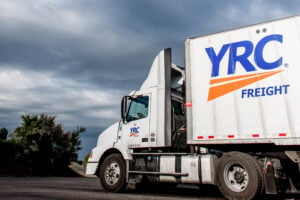Matt Chasen, CEO Founder uShip
There are a few rare events in the history of companies and industries that are truly game changers. Our team here at uShip has spent the last decade building the first successful transportation marketplace in the world. Since the earliest days of the Internet, thousands of startups have raised billions of dollars to attack the seemingly archaic industry that we all rely on to deliver the goods that go into the finished products we all take for granted, deliver finished goods to retail, and then move large goods around until the end of their useful lives. Everything around you has been on a truck several times and will likely be on trucks again.
Recent partnership coverage in the Wall Street Journal
Yet, as large and important as freight transportation is, the industry around the world has been stuck in the past. The deal we announced today was covered in the Wall Street Journal is evidence of several things that I see going on in our space.
INNOVATE, OR ELSE.
First, the smartest and most innovative of the incumbents in the logistics industry around the world recognize that they need to innovate or they will suffer a slow death. I know because I have met most of the CEOs of these companies and I see it on their faces and hear it in our conversations.
SAAS TRUMPS PROPRIETARY TECH.
Second, even the largest and smartest logistics companies in the world have found it impossible to undertake the technological and cultural change that is required to radically disrupt their own business. It’s not so much that software is so hard to build, but rather knowing specifically what model to use to redefine your relationship with carriers, having the entrepreneurial DNA to understand what your users are telling you, and to iterate and adapt until you achieve success. In many cases, transportation professionals will be asked to adopt technology intended to replace their jobs, or large parts of their jobs. Just look at the hundreds of millions of dollars that companies like DHL have written off trying. And I’m aware that many other large brokers are currently wasting similar amounts of cash (you know who you are). In transportation, as in most other industries, software as a service will win out over proprietary development.
RISK IN THE REWARD.
Third, as successful as we have been at uShip in building a completely self service marketplace model on pace for $200M in gross sales in 2016, we have still only scratched the surface of the $2.2T global market for freight. This is because the commercial space is incredibly risk averse. In the niche market for consumers and buyers to arrange their own freight shipping, we have dominated, but many large business shippers and enterprises who manage the majority of freight spend don’t even want to manage their own freight no matter how simple we make it. Managing carriers involves some risk and some decision makers don’t have the courage or ambition to bring it in-house rather than pay third parties to manage their logistics (in their defense, no SaaS platform has existed to help them do it).
Also, much of logistics is still rather complex, high risk and not as simple as hailing an Uber. Recently I had an extremely early flight to catch and was worried about the reliability of hailing an Uber at 4am compared to scheduling with a taxi the night before. The worst case if no drivers were nearby would be that I would have to drive myself and park at the airport, God forbid. Well, if you are an enterprise with entire supply chains, manufacturing operations, and customer shipments dependant on reliable and timely transportation, you’d get fired if you make a bet and it doesn’t work out. For enterprise customers, you need to marry technology with deep industry expertise and offer fail safe back stops.
THE HOLY GRAIL.
Ultimately, for a large segment of truck transportation, the day-to-day dispatching, tracking and execution of loads to carriers is extremely simple. Dispatching loads to large fleet carriers that you have contracts with does not add a lot of value (although there are some tech and transportation companies that have built good businesses doing this). The real holy grail is the ability to post loads out to tens of thousands of pre-approved carriers (including the 80% of carriers that are independent, owner-operators). Mobile is the key catalyst that is enabling this to happen but having great technology is not enough. What you also need is the trust of a large base of shipping customers, and billions of dollars worth of freight to become relevant for carriers.
DB Schenker LKW in Hongkong
This brings us to the recent news of uShip’s partnership with DB Schenker, the largest truck freight logistics company in Europe. Achieving the level of shipper scale, trust, and logistics expertise that DB Schenker has in Europe would take us decades if we could ever do it on our own. And that accelerates our progress while giving us a leg up on competition. Similarly, DB Schenker is a logistics company that doesn’t yet possess the nimble, entrepreneurial, technology DNA we bring to the table (no offense, guys). We’re providing them with the software to offer an online booking platform immediately.
As big as the largest logistics companies in the world are, even the largest represent only low single digit market share. We believe that by marrying the best logistics technology for truck freight with the largest and most trusted logistics company in Europe, we can together bring the majority off all shipping customers and carriers together on one common, efficient platform. In the process we can dramatically reduce wasted, empty miles and cut millions of tons of wasted emissions because no transparent, open marketplace for freight has achieved critical scale…until now! The partnership between uShip and DB Schenker is a milestone that will redefine the commercial freight industry in Europe and beyond for years to come.



